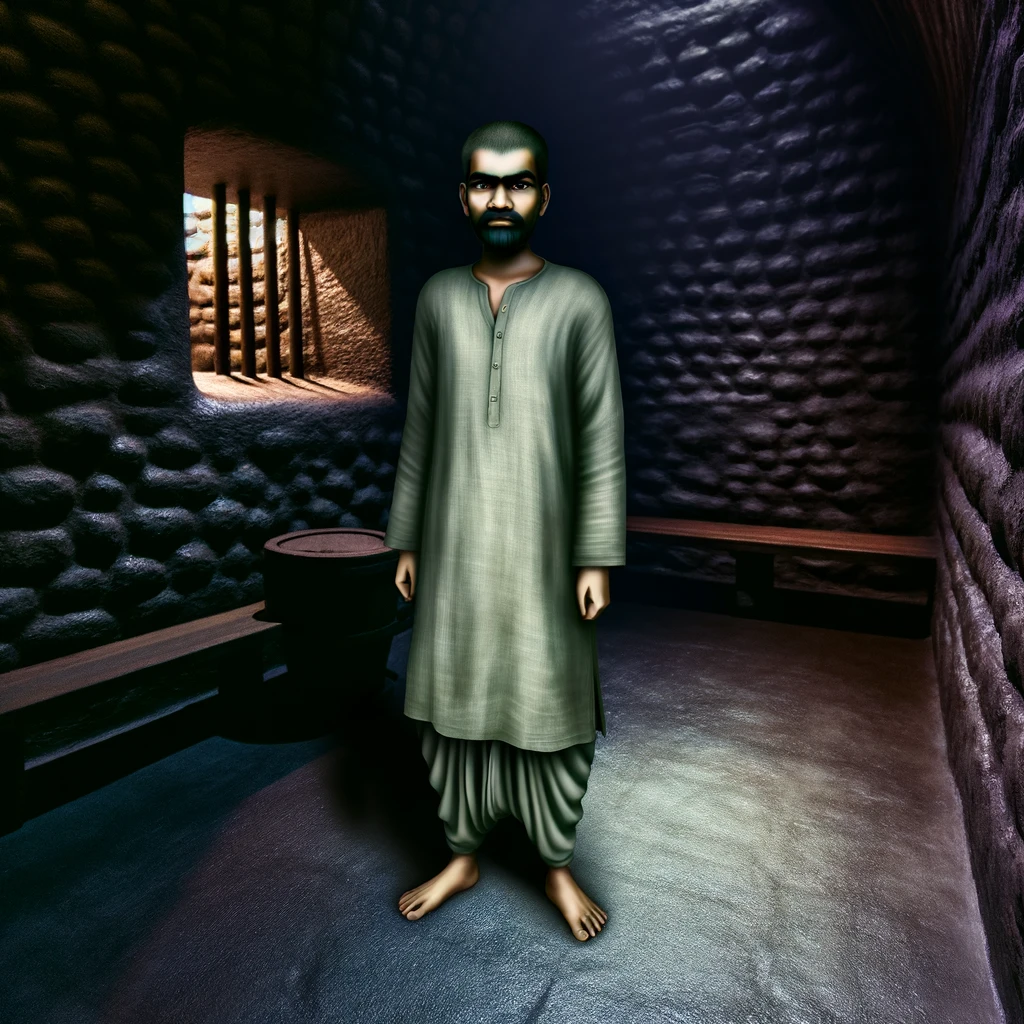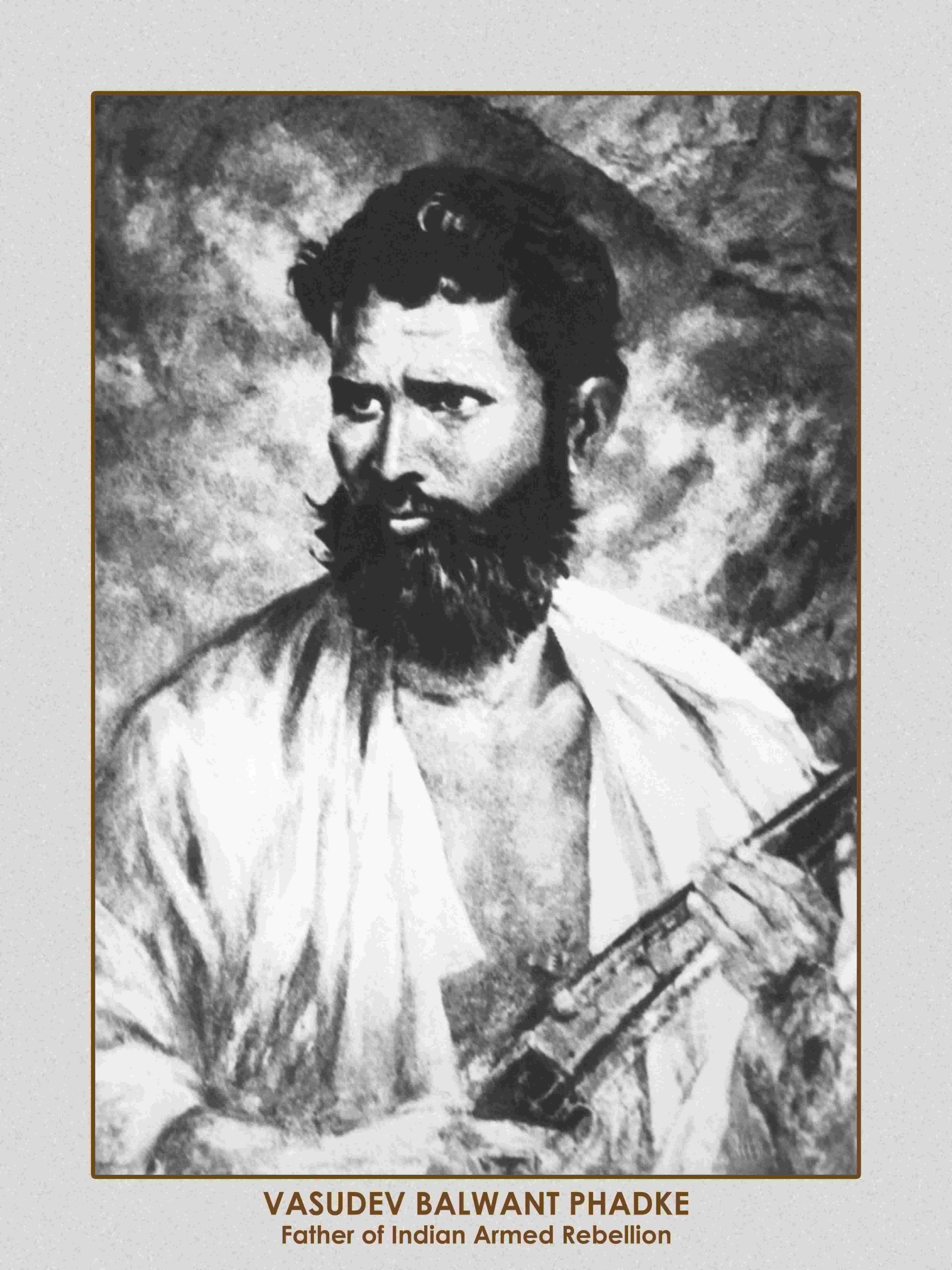Vasudeo Balwant Phadke:
Introducing Vasudeo Balwant Phadke
Vasudeo Balwant Phadke, a name etched in the annals of Indian history, is celebrated as a fearless freedom fighter and a revolutionary who dedicated his life to the cause of India’s independence. This essay explores the life and contributions of Vasudeo Balwant Phadke, shedding light on his early years, his revolutionary activities, and his enduring legacy.
Inner Dimensions: Understanding Phadke’s Personal Motivations and Emotions
To truly grasp the essence of Vasudeo Balwant Phadke’s revolutionary zeal, it is crucial to delve into the personal motivations and emotional underpinnings that drove his actions. Phadke’s upbringing in Shirdhon, Maharashtra—a region under the tightening grip of British colonial rule—instilled in him a deep-seated resentment towards the injustices imposed on his people. This formative environment, marked by stark disparities and everyday struggles, nurtured a profound sense of duty within Phadke to advocate for the oppressed. Personal reflections, diary entries, or recollections from those who knew him might reveal the inner turmoil and fervor that fueled his commitment to the cause. Understanding his emotional landscape and the personal convictions that guided his revolutionary path can provide a more nuanced view of his character and the sacrifices he made in pursuit of freedom.
Early Life and Influences
Vasudeo Balwant Phadke was born on November 4, 1845, in the village of Shirdhon in Maharashtra, during a period when British colonial rule was reshaping the traditional and socio-political landscapes of India. Raised in an era marked by glaring social inequalities and repressive governance, Phadke’s childhood and early adulthood were steeped in the realities of colonial oppression and the struggles of the indigenous populace. His education in Pune, a hub of intellectual and revolutionary activity, provided him with a foundation in both traditional Indian teachings and contemporary political thought. Pune’s vibrant atmosphere, enriched by social reform movements and discussions on political autonomy, played a crucial role in shaping his ideological outlook.
Political Awakening and Ideological Development
As Phadke matured during his years in Pune, he became profoundly influenced by the growing nationalist sentiments that permeated the city’s academic and social circles. Bal Gangadhar Tilak, a staunch advocate for self-rule and social reform, emerged as a pivotal figure in his political education. Tilak’s fiery rhetoric and bold initiatives, such as the establishment of the Ganapati Festival and Shivaji Jayanti as means to foster a sense of cultural pride and unity against the British, deeply impacted Phadke. Engaging with Tilak’s ideas and witnessing his efforts to mobilize the masses through these culturally significant events, Phadke was exposed to practical strategies for inciting and sustaining a movement. This environment did not only deepen his understanding of the political landscape but also crystallized his determination to challenge colonial rule. Phadke’s experiences during this critical period galvanized his commitment to advocating for the rights and freedoms of Indians, laying the groundwork for his subsequent role as a revolutionary leader.
The Revolutionary Activities
Vasudeo Balwant Phadke’s commitment to Indian independence ignited a series of bold revolutionary activities that marked his entry into active resistance against British rule. In 1879, Phadke orchestrated a significant public rally in Pune’s Phaltan Taluka, passionately calling for the dismantling of British authority. His dynamic oratory and compelling writings galvanized many, stirring a robust collective movement among the disenchanted masses.
Among his most strategic initiatives was the formation of the Ramoshi regiment, a formidable guerrilla group comprising disenfranchised locals. This regiment became the backbone of his revolutionary efforts, engaging in calculated acts of defiance against the colonial establishment. Phadke led from the front, masterminding a sequence of robberies designed to disrupt the economic stability of the British regime, thereby amassing the necessary funds and resources to sustain his campaign. This period was characterized by covert operations, sharp tactical maneuvers, and an unyielding resolve to challenge the colonial oppressors.
Strategic Endeavors and Motivations in Phadke’s Revolutionary Tactics
Vasudeo Balwant Phadke’s approach to the struggle for Indian independence was characterized by a series of carefully calculated tactics, deeply rooted in his motivations to end British colonial rule and instigate socio-political change. His strategic use of guerrilla warfare through the Ramoshi regiment exemplifies his commitment to adapting traditional Indian resistance methods to the contemporary context of his time. This regiment, primarily composed of marginalized individuals from local communities, employed hit-and-run tactics and sabotage, which were pivotal in disrupting the British administration’s sense of security and economic operations.
Phadke’s decision to engage in bank robberies and disrupt railway communications was driven by a strategic need to fund his movement and to weaken the infrastructure that was crucial to the British Raj’s control over India. These acts were not merely reactionary but were part of a larger strategy to create a sustainable resistance movement that could operate independently of mainstream colonial economic systems.
The broader socio-political context of the late 19th century, marked by widespread discontent due to oppressive policies such as high taxes and land revenue systems, significantly influenced Phadke’s activities. These policies exacerbated the plight of the peasantry and the lower classes, who formed the backbone of his support. Phadke’s tactics were thus not only aimed at weakening the British but also at rallying the common people, giving them a stake in the fight against colonial oppression by directly addressing their immediate grievances.
Personal Reflections: Insights into Phadke’s Character and Revolutionary Zeal
The narrative of Vasudeo Balwant Phadke, while rich in descriptions of his revolutionary activities and strategic maneuvers, lacks intimate personal anecdotes or direct quotes that could offer deeper insights into his character and fervor. Incorporating reflections from Phadke’s letters, speeches, or writings could illuminate his personal thoughts and emotional responses to the events of his time. For instance, excerpts from his correspondences might reveal his resolve and the emotional toll of his sacrifices, providing a more nuanced understanding of his motivations and the passion that drove his revolutionary actions. Such personal elements would not only humanize Phadke but also allow readers to connect more profoundly with his journey and the sacrifices involved in his fight for independence.
Through his revolutionary activities, Phadke sought to inspire a broader nationalist sentiment among Indians, which was crucial in a time when the struggle for independence was still in its nascent stages. His actions were designed to demonstrate that resistance was possible and that the British colonial rule was not an unchallengeable force. This period of Phadke’s leadership was crucial in setting the stage for future movements and played a significant role in the gradual build-up of organized efforts against the British Raj across India.
Arrest and Exile

As Vasudeo Balwant Phadke’s revolutionary endeavors intensified, they increasingly alarmed the British colonial authorities. His growing influence and the unrest he inspired among the masses made him a marked man in the eyes of the government. In 1879, after a relentless manhunt that showcased the colonial regime’s determination to quell dissent, Phadke was apprehended in Pune. This arrest marked a critical moment, dealing a significant blow to the burgeoning revolutionary movement he had helped cultivate. Following his capture, Phadke was subjected to a highly publicized and politically charged trial that underscored the British effort to make an example of him to deter others. He was sentenced to lifelong transportation to the Andaman Islands, a penal colony infamous for its brutal conditions and the psychological and physical isolation imposed on its prisoners. This sentence was not merely a punishment but a deliberate attempt to suppress the spirit of resistance among Indian nationalists.
Hell on Earth: Phadke’s Ordeal in Andaman Islands

The notorious Andaman Islands, often referred to as “The Hell on Earth” during the British colonial era, served as a brutal penal colony designed to break the spirits of India’s most resilient freedom fighters. Vasudeo Balwant Phadke’s confinement there marked one of the darkest periods of his life. Subjected to inhumane conditions, Phadke endured relentless physical and psychological hardships. The oppressive heat, rampant disease, and harsh labor under constant surveillance took a significant toll on his health and spirit. Accounts from fellow prisoners and British records suggest that the isolation from the mainland and the severing of connections with his revolutionary comrades deeply affected him. These adversities, however, did not completely diminish his resolve; they instead solidified his status as a martyr in the eyes of the Indian populace. Reflecting on his time in the Andamans provides a poignant insight into the extreme sacrifices made by Phadke and the indomitable spirit that characterized India’s fight for independence.
Enduring Legacy and Inspirational Impact
Vasudeo Balwant Phadke’s steadfast commitment to India’s liberation from colonial rule left an indelible mark on the nation’s history. His life and sacrifices became emblematic of the struggle for independence, embodying the spirit of defiance and the resilience required to oppose entrenched oppression. Phadke passed away under harsh conditions in the Andaman Islands on February 17, 1883, a poignant reminder of the heavy costs often associated with the pursuit of freedom. Despite this, his legacy continues to inspire subsequent generations, serving as a potent symbol of the impact that resolute courage can have against formidable odds. His story highlights the enduring influence of those who dare to challenge tyranny and motivates others to persist in the fight for justice and sovereignty. His contributions transcend time, illustrating that the journey toward national revival is paved by the sacrifices of those who refuse to succumb to oppression.
Concluding Reflections
Vasudeo Balwant Phadke’s life exemplifies the courage and resilience of Indian revolutionaries during the fight for independence. His unwavering commitment to the cause and his sacrifices serve as a beacon of hope and inspiration for those who continue to work towards a better, independent India. His legacy lives on, reminding us of the relentless pursuit of freedom that defined his life and the lives of many others who sought to liberate their homeland from colonial rule.
Feature Image: Click here to view the image. [Credit https://flickr.com]
